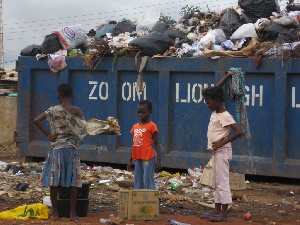Accra, July 20, GNA - The Government on Wednesday dismissed criticisms of the opposition New Patriotic Party (NPP) that it has failed to improve sanitary conditions in the manifesto of the ruling National Democratic Congress (NDC) saying it is scaling up efforts at waste disposal.
“We assure the good people of Ghana that though generally there are improvements in sanitary conditions when compared with 2008, Government will not accept the present situation…,” it said in a statement signed by the Deputy Minister of Information, Mr Samuel Okudzeto Ablakwa in Accra.
“… hence we are scaling up efforts at all fronts, including massive investments in infrastructure (and) modern methods of waste disposals, to ensure that our realistic target of making Ghana clean and eliminating its attendant health risks are met,” it said.
The statement said most Ghanaians had expected the NPP, “which had failed to implement any useful strategy to improve sanitary conditions even when they created the superfluous Ministry of Tourism and Beautification of the Capital City” to show some modicum of remorse and objectivity as government works hard to avoid the NPP’s legacy.
“We do not think that the ‘Konongo Kaya’ style of politics where those who fail to carry out their mandate and would also not assist nor permit others to try is the way forward for this country.”
Mr. Okudzeto Ablakwa, who served as Secretary to the Task Force, which was set up during the Transition as early as January 8, 2009 by President John Evans Atta Mills, just a day after he was sworn in as President and which was chaired by Dr. Christine Amoako Nuamah, revealed that the 100-day Task Force “rescued residents in Accra who were being drowned in filth from cataclysmic consequences”.
Mr. Okudzeto Ablakwa stressed that the Task Force found out immediately after commencing work that the whole of Accra had only one dump fill site, which was located at Kokroko, a suburb of Mallam. The others at Oblogo and Kwashiebu were full and no longer in use.
“What was worse, it had only a week to be full to capacity and no alternative was ready for use. Indeed coupled with this was the situation where there were heaps of refuse everywhere particularly markets and residences as 600 tonnes of refuse was left unattended to daily and the fact that the 15 Waste Management Contractors at the time had not been paid for several months and so most of them had laid down their tools.”
The statement said the Task Force averted a looming disaster by urgently collaborating with the Accra Metropolitan Assembly (AMA) and Zoomlion by locating a replacement site in an old quarry pit at Mallam at the base of the MacCarthy Hill, adjacent to an old disposal site.
A period of six weeks from January 22 to February 26, 2009 was set for the contractors to complete the evacuation of the heaps of solid wastes nationwide, it said, adding that this was achieved with much success.
It said the Task Force, meanwhile, ensured that the Kokroko-Mallam site was properly reclaimed as residents in the vicinity had been complaining and demonstrating under the NPP government because of the obvious threats and inconvenience which included leachate from the refuse finding its way into their homes and causing cracks in their buildings.
The statement said the reclamation included consultation with residents, pumping of water from the dump, spreading of the refuse to attain a level ground, capping the leveled refuse with laterite and construction of drains to carry leachate from the site.
Subsequently, the Task Force in partnership with the AMA and Zoomlion ensured that a main dump fill site at Sarba in Weija was in good time designed and constructed to serve Accra.
The statement added that Government was pleased with the work of the Task Force as it within 100 days did a lot to avert crisis, ensured a clean nation and made far reaching recommendations.
Mr. Okudzeto Ablakwa added that it was “sad and unfortunate” that the recent outbreak of cholera had been exploited for cheap political capital by the NPP when the NPP knew that what we must all commit ourselves to as a nation was to devise ways of halting what had become an annual ritual.
Mr. Okudzeto Ablakwa said that the NPP was aware of statistics at the Ghana Health Service which painted this sad yearly picture.
He cited some examples from the Greater Accra Region where in 2001 there were 1,387 cases of cholera out of which 42 people died. In 2002 there were 2,044 cases out of which 47 died; in 2005 there 1,812 cases out of which 21 died and in 2006, there were 1,290 cases out of which 21 died all in the Greater Accra Region alone.
General News of Wednesday, 20 July 2011
Source: GNA

















